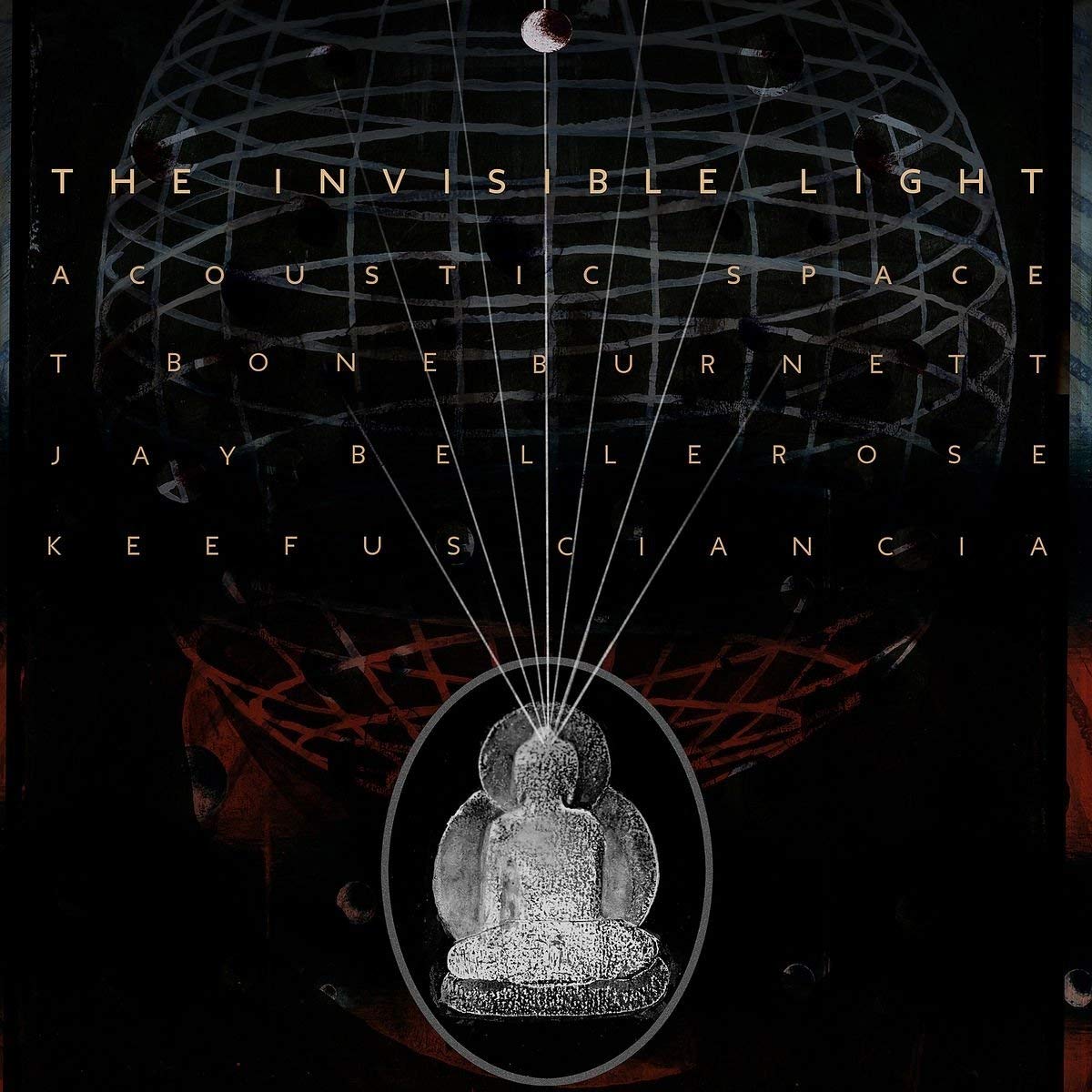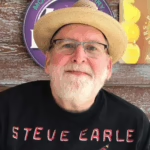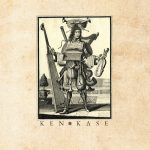 T Bone Burnett / Jay Bellerose / Keefus Ciancia
T Bone Burnett / Jay Bellerose / Keefus Ciancia
The Invisible Light: Acoustic Space
Verve Forecast [2019]

Fire Note Says: Producer/artist/influencer, T Bone Burnett joins forces to create a strong experimental soundtrack for these challenging times.
Album Review: “`The Invisible Light,’” explains T Bone Burnett in this album’s liner notes, “is a song cycle concerned with the reality that we have been the subjects of over a century of electronic programming. It is trance music. It is folk music and electronic music. It is tribal and global.” So, you got that? He goes on, “There are long, abstract passages to allow listeners the possibility of stretching their attention spans. It’s deprogramming music. It is anti-dote-hypnotic pro-humanity music. We call this Trip Visualist Music.” If that doesn’t make any sense, believe me, I understand. But, having heard the album’s seven experimental tracks a half dozen times through, I can assure you that it is a pretty accurate description of what you’ll find in this curious collection.
Of course, T Bone Burnett is best known as the producer of other artists, and the go-to music source behind award winning soundtracks for films like “O Brother, Where Art Thou?”, “Crazy Heart,” and “Walk the Line,” as well as TV shows like “Nashville” and HBO’s “True Detectives.” But Burnett’s influence expands beyond even those artistic triumphs, since his work on the above Coen Bros. film reignited an interest in American folk & country roots music, and artists like Ralph Stanley, Emmylou Harris, Alison Krauss, Gillian Welch and a host of others, sparking a collaborative tour that was one of the don’t miss events in the summer to 2001.
Among the dozens of artists Burnett has produced albums for is the Robert Plant and Alison Krauss collaboration on “Raising Sand,” which won the Grammy for Album of the Year in 2008, but he’s also celebrated for breakout debut and career defining albums by artists as varied as Counting Crows, Los Lobos, Elvis Costello, Peter Case, Sam Phillips, and Roy Orbison. In short, you’d be hard pressed to name a more influential presence in the music business in recent decades, but his early career got jump-started when he was invited to join Bob Dylan’s notorious “Rolling Thunder Revue,” which toured throughout 1975 and ’76. That tour is gaining new interest thanks to the Netflix airing of a new documentary: “Rolling Thunder Revue: A Bob Dylan Story by Martin Scorsese.” Burnett joined with two other RTR participants, Steven Soles and David Mansfield, to form The Alpha Band, which recorded 3 fine albums, before he started his solo career with the excellent 1980 debut, “Truth Decay.” Fans of Burnett’s clever songwriting and musical smarts delight in that defining work, as well as the EP follow-up, “Trap Door,” and 1983’s “Proof Through the Night.” At this late date, the best way to access his catalog of classic songs – “Power of Love,” “Shut It Tight,” and “River of Love” to name but a few – is the 1992 release of “Twenty Twenty: The Essential T Bone Burnett.”
But fans of his early work with its deep connections to the musical influences of his childhood in Texas, folk, country, and rock & roll, will hear something very different on this newest collaboration with Keefus Ciancia, credited with Action Mechanisms and Thrums, and Jay Bellerose, who provided Pulse Timing Circuits. The musical connections here resonate most closely to Burnett’s work on the ethereal soundscapes used on recent seasons of “True Detectives,” percussive drum loops establish basic rhythms, while Burnett, in his beat poet spoken word head space talks over beds of found sounds, eerily designed to expose the underlying tensions in our culture’s dependence on technology and it’s dehumanizing effects. While clearly an artistic endeavor, the essential message of The Invisible Light: Acoustic Space, echoes the grave forecast that Burnett presented in his keynote speech at SXSW this spring, which takes a dim view where we have landed as a technological society often at the whim or wealthy corporations who have tapped into our lives, eliminated privacy while draining away most of the financial dividends previously available to actual musicians, creatives and artists. (You can hear or read it here: https://www.sxsw.com/music/2019/keynote-speaker-t-bone-burnett/)
There’s a rugged musicality in these tone poems, but few will mistake them for actual songs, with distinct melodies, verses or choruses. This truly experimental effort pushes against traditional expectations we bring to musical projects, aiming it seems for the kind of impact you’d expect to experience in an exhibit at the Museum of Modern Art, with periods extraneous noises and of near silence, like that the end of “A Man Without a Country (All Data Are Compromised).” Of greatest interest to some who appreciated Burnett’s clever use of languages in the lyrics of his songs, will be the poetry delivered throughout, which includes observations of our challenging time like “Life’s no pleasure unless you’re with the one you love,” “I had thought the world would be further along by now/That there wouldn’t be this degree of cruelty,” and “If you tell people what they already believe they will believe you/It doesn’t matter that you don’t believe a word you say.” Clearly some of these lyrics address our current President (“Walking cross the water to the very gate of hell/Where anyone can buy and sell/Anything on which one can dwell/Where the Celebrity In Chief/Comes to grief”), but realistically his negative influence is more a symptom than the cause. Burnett’s targets are far less obvious, the powers behind the media we’ve allowed to dominate our way of living in and with the world.
Which leads this writer, long a fan of Burnett’s music, thinking and ideals, to the conclusion that as interesting and curious this work is, it’s far less satisfying as a musical production, a piece of art. Burnett’s goal to challenge our complacency and general apathy, to get us to think outside the box that is our technological gadgetry, will be limited by the challenging nature of the music itself. This is in no way easy listening, it’s an invitation to work a puzzle rather than a chance to listen to a catchy melody or dance to a song with a great beat, which is something for which we rarely turn to music. “Acoustic Space,” we’re told, is only the first of a three part body of work. It’s not clear what musical direction the remaining sections will take, but while one can appreciate the desire of Burnett expressed in the Itopia Chant, that “We want you to know/You can learn anything,” he might want to remember how much folk enjoyed a fun rock and roll song like “Driving Wheel” off of “Truth Decay,” and consider how much more appealing his message would be if carried in a more accessible form.
Key Tracks: “High John” / “To Beat the Devil” / “Being There”
Artists With Similar Fire: Brian Eno / David Byrne’s soundtrack work / Coil
T Bone Burnett Website
Verve Forecast
– Reviewed by Brian Q. Newcomb
Brian Quincy Newcomb has found work as rock critic and music journalist since the early 80's, contributing over the years to Billboard Magazine, Paste, The Riverfront Times, and The St. Louis Post-Dispatch. [Brain sadly passed away on April 15, 2024, but his reviews live on as a lasting tribute to his impact on music journalism. We keep him on our minds with every review we post.]





